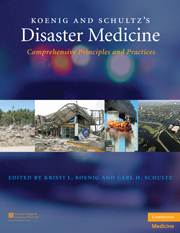Book contents
- Frontmatter
- Contents
- List of Contributors
- Contributor Biographies
- Foreword
- Preface
- Acknowledgments
- PART I CONCEPTUAL FRAMEWORK AND STRATEGIC OVERVIEW
- PART II OPERATIONAL ISSUES
- 9 Public Health and Emergency Management Systems
- 10 Legislative Authorities and Regulatory Issues
- 11 Syndromic Surveillance
- 12 Triage
- 13 Personal Protective Equipment
- 14 Decontamination
- 15 Quarantine
- 16 Mass Dispensing of Antibiotics and Vaccines
- 17 Management of Mass Gatherings
- 18 Transportation Disasters
- 19 Emergency Medical Services Scene Management
- 20 Healthcare Facility Disaster Management
- 21 Mass Fatality Management
- 22 Crisis and Emergency Risk Communication
- 23 Telemedicine and Telehealth Role in Public Health Emergencies
- 24 Complex Public Health Emergencies
- 25 Patient Identification and Tracking
- PART III CLINICAL MANAGEMENT
- Index
- Plate section
- References
13 - Personal Protective Equipment
from PART II - OPERATIONAL ISSUES
Published online by Cambridge University Press: 05 August 2011
- Frontmatter
- Contents
- List of Contributors
- Contributor Biographies
- Foreword
- Preface
- Acknowledgments
- PART I CONCEPTUAL FRAMEWORK AND STRATEGIC OVERVIEW
- PART II OPERATIONAL ISSUES
- 9 Public Health and Emergency Management Systems
- 10 Legislative Authorities and Regulatory Issues
- 11 Syndromic Surveillance
- 12 Triage
- 13 Personal Protective Equipment
- 14 Decontamination
- 15 Quarantine
- 16 Mass Dispensing of Antibiotics and Vaccines
- 17 Management of Mass Gatherings
- 18 Transportation Disasters
- 19 Emergency Medical Services Scene Management
- 20 Healthcare Facility Disaster Management
- 21 Mass Fatality Management
- 22 Crisis and Emergency Risk Communication
- 23 Telemedicine and Telehealth Role in Public Health Emergencies
- 24 Complex Public Health Emergencies
- 25 Patient Identification and Tracking
- PART III CLINICAL MANAGEMENT
- Index
- Plate section
- References
Summary
OVERVIEW
Following terrorist attacks such as the September 11, 2001 events in the United States, governments around the world at local, state, and federal levels placed increased emphasis on preparedness efforts. Vendors capitalized on this heightened attention by embarking on aggressive marketing campaigns flooding marketplaces with advertisements for disaster survival kits, survival manuals, evacuation plans, instruction manuals on protecting families during a terrorist attack, and information on “the very best” personal protective equipment (PPE). However, as the time interval since the latest disaster increases, both public and government interest in being prepared tend to fade. For example, in the United States, at the time of this writing, there is no federal law requiring state and local officials to plan for the evacuation of the sick, elderly, disabled, or impoverished. Ironically, pets are more protected as both houses of the U.S. Congress passed bills that require local governments to plan for the evacuation of pets. Nonetheless, some progress is being made in the area of PPE.
PPE is being considered by many organizations and agencies. These agencies are purchasing and supplying equipment for the protection of the workforce from possible attacks and threats uncovered through a hazards vulnerability analysis. Numerous pitfalls, obstacles, and confusing directions exist regarding equipment selection and indications for use in protecting individuals from a possible unknown hazard.
Keywords
- Type
- Chapter
- Information
- Koenig and Schultz's Disaster MedicineComprehensive Principles and Practices, pp. 184 - 194Publisher: Cambridge University PressPrint publication year: 2009

